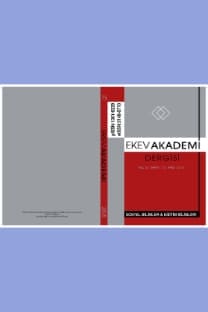TÜRK TOPLUMUNUN COVİD-19’A İLİŞKİNBİLGİ, TUTUM VE UYGULAMALARI
Knowledge, Attitude and Practices of Turkish Society About Covid-19
___
Atar A., Urgan S. ve Erdoğan P. (2020). Covid-19 Pandemi dönemindeki iyimserlik-kötüm-serlik ve yaşam tatmininin demografik değişkenler açısından incelenmesi. Pearson Journal of Social Scıences & Humanities,7(7), 263-278.Bhagavathula, S. A., Aldhaleei, A. W., Rahmani, J., Mahabadi, A. M. and Bandari, K. D. (2020). Novel coronavirus (COVID-19) knowledge and perceptions: A survey of healthcare workers. medRXiv, 1-15.
Carrington, D. (2020). Halt destruction of nature or suffer even worse pandemics, say world’s top scientists. https://tinyurl.com/ybr67snn adresinden 29 Nisan 2020’de alınmıştır.
Gao, W., Ping, S. and Liu, X. (2020). Gender differences in depression, anxiety, and stress among college students: A longitudinal study from China. Journal of Affect Disorders,263, 292–300.
Gostin, L. (2006). Public health strategies for pandemic influenza. JAMA,295(14), 1700-1704.
Greenhill, R. (2019). State capacity influences on pandemic preparedness for the Sub-Saharan African region. Central Michigan University: ProQuest Dissertations Publishing.
Guo, X., Meng, Z., Huang, G., Fan, J., Zhou, W., Ling, W., Jiang, J., Long, J. and Su, L. (2016). Meta-analysis of the prevalence of anxiety disorders in mainland China from 2000 to 2015. Scientific Reports,6, 28033. https://doi.org/10.1038/srep28033.
Hoffman, S. J. and Silverberg, S. L. (2018). Delays in global disease outbreak responses: Lessons from H1N1, Ebola, and Zika. American Journal of Public Health,108(3), 329-333.
Huang, Y. and Zhao N. (2020). Generalized anxiety disorder, depressive symptoms and sleep quality during COVID-19 outbreak in China: A web-based cross-sectional survey. Psychiatry Research,288, 1-6.
Khasawneh, I. A., Humeidan, A. A., Alsulaiman, W. J., Bloukh, S., Ramadan, M., Al-Shatanawi, N. T., Awad, H. H., Hijazi, Y. W., Al-Kammash, R. K., Obeidat, N., Saleh, T. and Kheirallah, A. K. (2020). Medical students and COVID-19: Knowledge, attitudes, and precautionary measures. a descriptive study from Jordan. Frontiers in Public Health,8(253), 1-9.
Maaravi, Y. and Heller, B. (2020). Not all worries were created equal: the case of COVID-19 anxiety. Public Health, 185, 243-245.
Saqlain, M., Munir, M. M., Rehman, U. S., Gulzar, A., Naz, S., Ahmed, Z., Tahir, H. A. and Mashhood, M. (2020). Knowledge, attitude, practice and perceived barriers among healthcare workers regarding COVID-19: A cross-sectional survey from Pakistan. Journal of Hospital Infection,105, 419-423.
Sögüt, S. and Cangöl, E. (2020). The relationship between COVID-19 knowledge levels and anxiety states of midwifery students during the outbreak: Across-sectional web-based survey. Wiley Perspectives in Psychiatric Care, 1-7.
Zhong, B., Luo, W., Li, H., Zhang, Q., Liu, X., Li, W. and Li, Y. (2020). Knowledge, attitudes, and practices towards Covid-19 among Chinese residents during the rapid rise period of the Covid-19 outbreak: A quick online cross-sectional survey. International Journal of Biological Sciences, 16(10), 1745-1752.
- ISSN: 1301-6229
- Yayın Aralığı: 4
- Başlangıç: 1996
- Yayıncı: ERZURUM KÜLTÜR VE EĞİTİM VAKFI
2018 İLKÖĞRETİM VE ORTAÖĞRETİM PROGRAMLARINDA ÇEVRE KONUSUNUN YERİ
BİTLİS KALESİ DEPOLAMA ALANI SERAMİK BULUNTULARI
Yunus Emre KARASU, Korkmaz ŞEN
EĞİTSEL OYUNLARDA ÜSTBİLİŞ STRATEJİLERİ(*): BİR LİTERATÜR ARAŞTIRMASI
HADİS İLMİNDE KADIN MUHADDİSLERİN LAKAPLARI ÜZERİNE BİR İNCELEME
KLARNETİN ERZURUM GELENEKSEL MÜZİK KÜLTÜRÜNDEKİ YERİ ÜZERİNE BİR İNCELEME
Emre KUZULUGİL, Mehmet Can PELİKOĞLU
SUSMANIN VE KONUŞMANIN ÖLÇÜSÜ: SAMT
SUKUK’UN PAZARLANMASINDA KARŞILAŞILAN SORUNLAR
TÜRK TOPLUMUNUN COVİD-19’A İLİŞKİNBİLGİ, TUTUM VE UYGULAMALARI
